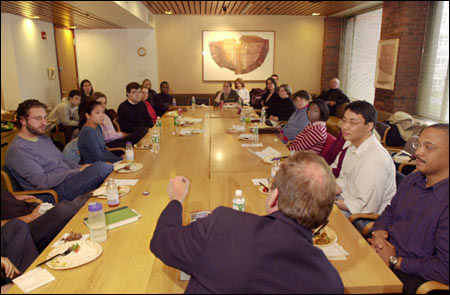How to get there from here:
COACH helps kids put college in their future

There’s no shortage of college aspirations among low-income high school students. What distinguishes low-income kids from their middle class peers is follow through.
A recent study by Christopher Avery, Kennedy School of Government (KSG) professor of public policy, and Thomas J. Kane, former KSG professor, now at the School of Public Policy and Social Research, University of California, Los Angeles, shows that while the college aspirations of inner-city high school students and suburban students are very similar, the suburban kids tend to do what is necessary to realize their goals while the inner-city youngsters drop off along the way.
“If you compare students in inner-city schools with those in suburban schools, you find that everybody wants to go to a four-year college,” said Avery. “But kids at the city schools tend to fall off at various stages until at the end a relatively small percentage actually go.”
In 1999, Avery and Kane began trying to change those results with a program they called COACH (College Opportunity And Career Help). COACH volunteers try to level the playing field by working with high school students in Charlestown, South Boston, and Dorchester to provide information and instruction on how to navigate the college application and financial aid process.
This Monday (May 12), a group of COACH volunteers gathered at the Kennedy School of Government to discuss their experiences helping low-income students clear the hurdles that stand between them and their college aspirations.
Many of the volunteers found that they were able to gradually demystify the college application process and thus bring the goal of college a little bit closer to reality.
“I found there was an initial wonderment about college. The students had no sense of how to get from here to there,” said KSG student Filipe Perez. “But toward the end of the semester, they were asking more specific questions, like, ‘When I’m at college, how many hours will I have to study?’ or ‘Where will I live?’ or ‘Are the parties fun?’”
Others found that working with the volunteers made the students’ college aspirations more acceptable among their friends and fellow students.
“For those students who were thinking about college, COACH helped by giving them the language to talk about it and by easing peer pressure and making it okay,” said KSG student Gee Kim.
Other volunteers found that working in the COACH program gave them an opportunity to help adjust the students’ aspirations to reality by giving them a clearer idea of what it would take to achieve their goals.
“Sometimes you realize there’s a train wreck coming because the students’ skill set doesn’t compare with their aspirations. I think many of them don’t realize that the value of college is to ease you into the real world,” said KSG student Bram Elias.
Harvard College junior Alrick Edwards agreed. “Many of them don’t realize how much schooling is necessary to achieve their goals. And they often get discouraged, but then they recover, which is great.”
Sometimes the failure to do the necessary follow-up lies not with the individual student but with the high school itself.
“In the high school where I worked, getting a transcript mailed to a college was a multistep process with lots of little pieces to it, and the student could become discouraged or sidetracked at many points along the way,” said KSG student Kristin Wiley.
Avery said that his four years of working with the COACH program has given him a sense of “tempered optimism.” One of the strengths of the program has been the relationships between students and volunteers, which he said have been “just fantastic.” But despite the closeness of these relationships, not every student succeeds in getting into college.
“We’re doing a good job of pushing them along, but we can’t do it for them. I think what we’ve found is that you don’t need to go to a four-year college to succeed. Some of them aren’t prepared, or they’re not ready psychologically. But you can sow the seeds. They might not be ready to go to college right away, but maybe they’ll go in a few years.”




